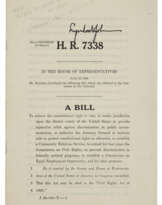ID 1033018
Lot 357 | A pen used to sign the Voting Rights Act of 1965
Valeur estimée
$ 10 000 – 15 000
155mm long, 10mm at widest point. Identification slip trimmed to fit the pen's cardboard box.
A pen used to sign the Voting Rights Act of 1965—presented to Civil Rights leader James Farmer, Jr. While the 1964 Civil Rights Act proved instrumental in breaking down legal segregation in the United States, the issue of access to the polls for Black Americans in the South remained a major obstacle. It would take the police riot against marchers demonstrating for voting rights in Selma, Alabama in March 1965 to spur the Johnson Administration to action on this front. Johnson's first response was to convene a joint session of Congress where he delivered his historic, "We Shall Overcome," address on 15 March. Two days later, on 17 March, Senate Majority Leader Mike Mansfield and Senate Minority Leader Everett Dirksen co-sponsored S. 1564, with the House of Representatives introducing its own version of the bill on the 19th. Following months of wrangling, the Senate and House versions only differed on the subject of poll taxes. The Senate version allowed the Attorney General to sue a state that was using poll taxes for the purposes of discrimination while the House version banned the practice entirely. The Attorney General drafted a compromise that asserted that poll taxes were unconstitutional and instructed the Department of Justice to sue the offending states, but it did not help break the impasse. It would take Attorney General Katzenbach's enlistment of the support of Martin Luther King, Jr. for the compromise for the conference committee to approve the historic legislation. Lyndon Johnson invited the leadership of the Civil Rights movement to attend the signing ceremony at the White House on 6 August 1965 including the "Big Six": Martin Luther King, Jr., John L. Lewis, president of the Student Nonviolent Coordinating Committee (SNCC), A. Philip Randolph, Roy Wilkins, Whitney Young and James L. Farmer. Farmer (1920-1999) was the director of the Congress of Racial Equality (CORE) who led the Freedom Rides beginning in 1961. Provenance: Lyndon Johnson – (presented to) James Farmer Jr. – by descent to his daughter – (gift to) a family friend – (gift to) the consignor.
| Artiste: | Lyndon Baines Johnson (1908 - 1973) |
|---|---|
| Lieu d'origine: | Etats-Unis |
| Catégorie maison de vente aux enchères: | Tous les autres types d'objets |
| Artiste: | Lyndon Baines Johnson (1908 - 1973) |
|---|---|
| Lieu d'origine: | Etats-Unis |
| Catégorie maison de vente aux enchères: | Tous les autres types d'objets |
| Adresse de l'enchère |
CHRISTIE'S 20 Rockefeller Plaza 10020 New York Etats-Unis | ||||||||||||||
|---|---|---|---|---|---|---|---|---|---|---|---|---|---|---|---|
| Aperçu |
| ||||||||||||||
| Téléphone | +1 212 636 2000 | ||||||||||||||
| Fax | +1 212 636 4930 | ||||||||||||||
| Conditions d'utilisation | Conditions d'utilisation | ||||||||||||||
| transport |
Service postal Service de messagerie ramassage par vous-même | ||||||||||||||
| Modes de paiement |
Virement bancaire | ||||||||||||||
| Heures d'ouverture | Heures d'ouverture
|





